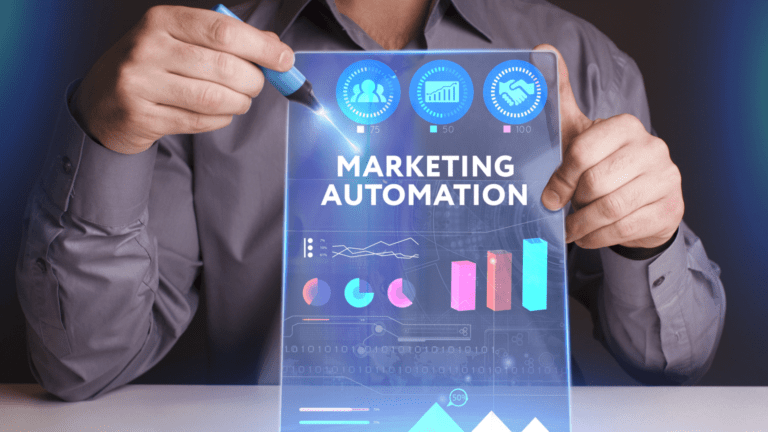How AI is Revolutionizing Web Analytics: What Businesses Need to Know
Businesses utilize web analytics to better analyze user behavior, optimize websites, and increase conversions in the dynamic digital landscape. Although conventional web analytics solutions offer insightful data, artificial intelligence (AI) is transforming the way businesses collect, analyze, and use data. Web analytics has advanced with artificial intelligence (AI) from simple data collection to a field where automation, predictive analytics, and machine learning are revolutionizing decision-making. Discover in-depth how artificial intelligence is changing web analytics and what companies need to know to stay competitive.

The Rise of AI in Web Analytics
By automating data collecting, spotting trends, and providing insights that were previously too difficult or time-consuming to find manually, AI-powered technologies are intended to improve traditional analytics. To convert massive volumes of data into useful information, these tools make use of machine learning techniques, natural language processing (NLP), and sophisticated statistical models.
The following are the main areas of web analytics where AI is having the biggest impact:
1. Predictive Analytics
Predictive analytics is one of the most potent ways AI is revolutionizing web analytics. AI is able to forecast future actions by examining historical user behavior and spotting patterns. For instance, companies may now predict which customers are most likely to abandon their accounts, which marketing initiatives will result in the highest number of conversions, or which goods will be in great demand.
Benefits for Businesses:
- Engage users who are at danger of quitting proactively.
- Optimize marketing plans in light of anticipated future outcomes.
- Invest resources in areas with high potential returns with more efficacy.
2. Real-Time Data Processing
Businesses can now handle enormous volumes of data in real time thanks to AI. Because human analysis was frequently necessary for traditional web analytics, organizations were not always able to respond quickly to changes in user behavior. Web analytics solutions that use AI are able to identify anomalies, such a sudden rise in traffic or a decline in conversions, and send out automated reactions or notifications.
Benefits for Businesses:
- React quickly when opportunities or issues present themselves.
- Real-time user experience and website performance optimization.
- Automate tasks like making offers of specials during busy periods or doing last-minute repairs.
3. Enhanced User Segmentation
AI enables firms to develop highly precise audience segmentation by analyzing user data more thoroughly than ever before. AI-driven web analytics systems can take into account a variety of factors, such as how users engage with the website, their past purchases, and even their attitude as revealed by reviews or feedback, in addition to demographics and behavior.
Benefits for Businesses:
- Develop marketing initiatives that are more individualized.
- Send users offers and articles that are more pertinent to them.
- By concentrating on high-potential consumer segments, increase conversion rates.
4. Automated Insights and Recommendations
The most difficult thing about traditional web analytics is correctly analyzing data. AI tools are able to autonomously evaluate datasets and offer recommendations and actionable insights to enterprises. These insights may include recommendations for bettering the user experience on a tailored basis or optimizing websites.

Benefits for Businesses:
- Cut down on the time you spend analyzing data by hand.
- Get insights that are more precise and complex than what human analysts might discover.
- Put more emphasis on making decisions than gathering data.
5. Sentiment Analysis
Natural Language Processing (NLP) enables sentiment analysis on customer reviews, social media comments, and feedback using AI-driven solutions. Businesses can gain a better knowledge of customer satisfaction and emotion about their brand, goods, or services with the help of this feature.
Benefits for Businesses:
- Discover consumer sentiment in greater detail than just through surveys and star ratings.
- React to unfavorable comments or patterns before they affect how people see your brand.
- Keep an eye on client feedback to make improvements to your goods.
6. AI-Driven Personalization
Increasing user engagement and conversion rates requires personalization. AI is able to provide individualized experiences, like content recommendations, targeted promotions, and product recommendations, by analyzing each user’s behavior in real time.
Benefits for Businesses:
- By providing customized experiences, you can increase user engagement.
- Increase conversion rates by suggesting related products.
- Improve user satisfaction with more individualized journeys to keep people coming back.
7. Data Cleansing and Management
AI is essential to data purification since it guarantees that companies are working with correct, high-quality data. AI-driven technologies are able to spot mistakes, inconsistencies, and anomalies in datasets that might otherwise cause conclusions to be drawn incorrectly.
Benefits for Businesses:
- Make sure the data is accurate because it is essential to make wise decisions.
- Reduce the time and materials needed for manual data cleaning.
- Based on solid information, develop more accurate forecasts and strategic plans.
Key AI Tools Transforming Web Analytics
A number of web analytics solutions with AI capabilities are at the forefront of revolutionizing the way businesses gather and utilize data. Among the noteworthy instances are:
- Google Analytics 4: Google’s most recent analytics tool uses machine learning to provide more in-depth user segmentation and prediction insights.
- Adobe Analytics: It is a well-known AI tool that offers real-time data processing, predictive modeling, and sophisticated analysis.
- Hotjar: Provides heatmaps, session records, and feedback analysis by fusing AI and traditional analytics.
- Heap: A program that employs AI to find patterns in user behavior and possible bottlenecks while automating data collection.
The Future of AI in Web Analytics
AI will become more and more important in web analytics as the technology develops. In the upcoming years, keep an eye out for the following trends:

- Voice and Visual Search Analytics: Artificial Intelligence (AI) will play a crucial role in assessing and refining these novel search formats, as voice-activated devices and visual search become more prevalent.
- AI-Powered Privacy Tools: As worries about data privacy increase, AI will be essential in assisting companies in navigating and adhering to laws like the CCPA and GDPR.
- Hyper-Personalization: Businesses will be able to offer hyper-personalized experiences thanks to future AI models that will offer even more detailed insights into the preferences of specific users.
Challenges and Considerations
Businesses need to be aware of potential obstacles like these even if AI offers great promise to transform web analytics.
- Data Privacy Issues: As data collecting grows, so does the obligation to protect data privacy. AI must be used by businesses in an ethical and legal manner.
- Cost and Implementation: AI solutions can be expensive and hard to implement, needing specialized individuals to manage and maintain.
- Over-Reliance on Automation: Although AI is capable of automating a lot of activities, human monitoring is still necessary. Without being aware of its limitations, relying exclusively on AI may result in lost opportunities or inaccurate conclusions.
Conclusion
The field of web analytics is changing due to artificial intelligence, which is giving companies new and effective tools to forecast user behavior, customize user experiences, and make decisions automatically. Businesses may improve their digital presence for more success, obtain deeper insights, and react to changes faster by incorporating AI into their web analytics initiatives. To fully utilize this game-changing technology, AI must be balanced in its powers with ethical issues and human control.
The future of web analytics looks to be even more dynamic as AI develops, giving organizations the ability to stay ahead in a digital environment that is becoming more and more competitive.







